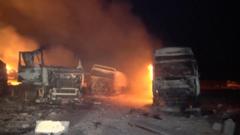As Iran and the United States gear up for a crucial second round of nuclear negotiations in Rome, newfound optimism for a peaceful resolution is overshadowed by escalating military rhetoric and conflicting statements from both sides. U.S. President Donald Trump has continued to emphasize the stark choice for Tehran: negotiate a new deal or face war, while simultaneously dismissing proposals for preemptive military action against Iranian nuclear sites.
Navigating Tensions: The Future of Iran Nuclear Talks Amidst Military Threats

Navigating Tensions: The Future of Iran Nuclear Talks Amidst Military Threats
Amidst heightened military threats, the upcoming Iran-U.S. nuclear talks face uncertainty as mixed signals complicate diplomatic efforts.
Concerns are rooted in the aftermath of the U.S.'s withdrawal from the 2015 nuclear deal, which has led to significant advancements in Iran's nuclear capabilities. Despite Iran's expanding stockpile of highly-enriched uranium, officials maintain that negotiations are purely based on U.S. actions, not military intimidation. The tension-filled environment is further complicated by internal contradictions in U.S. negotiating tactics, idealizing an enforceable framework for future stability while allowing Iran limited enrichment.
The upcoming talks are taking place against a backdrop of heightened diplomatic activity in the region, with significant exchanges between Iranian leadership and neighboring countries, alongside warnings directed at the U.S. regarding potential military retaliation. Yet mutual distrust persists, amplified by Iran's historical concerns from U.S. foreign policy and ongoing threats to its sovereignty.
As anticipation grows around the talks, fears about public discontent in Iran due to economic struggles also loom large, suggesting that for Tehran, the stakes are even higher than averting military conflict—publication regarding the talks serves as a critical distraction amidst both international and domestic pressures.
With each side promoting divergent narratives about the negotiation process itself, the question remains whether any meaningful agreement can emerge from these fraught discussions in the coming days.
The upcoming talks are taking place against a backdrop of heightened diplomatic activity in the region, with significant exchanges between Iranian leadership and neighboring countries, alongside warnings directed at the U.S. regarding potential military retaliation. Yet mutual distrust persists, amplified by Iran's historical concerns from U.S. foreign policy and ongoing threats to its sovereignty.
As anticipation grows around the talks, fears about public discontent in Iran due to economic struggles also loom large, suggesting that for Tehran, the stakes are even higher than averting military conflict—publication regarding the talks serves as a critical distraction amidst both international and domestic pressures.
With each side promoting divergent narratives about the negotiation process itself, the question remains whether any meaningful agreement can emerge from these fraught discussions in the coming days.























